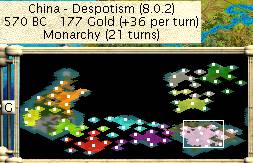 The last diplomatic decision I have to make is whether to fork over $260 to Egypt for a world map. I think so; that's invaluable information. Egypt's world map apparently consists of everybody's territory maps but no actual world maps:
The last diplomatic decision I have to make is whether to fork over $260 to Egypt for a world map. I think so; that's invaluable information. Egypt's world map apparently consists of everybody's territory maps but no actual world maps: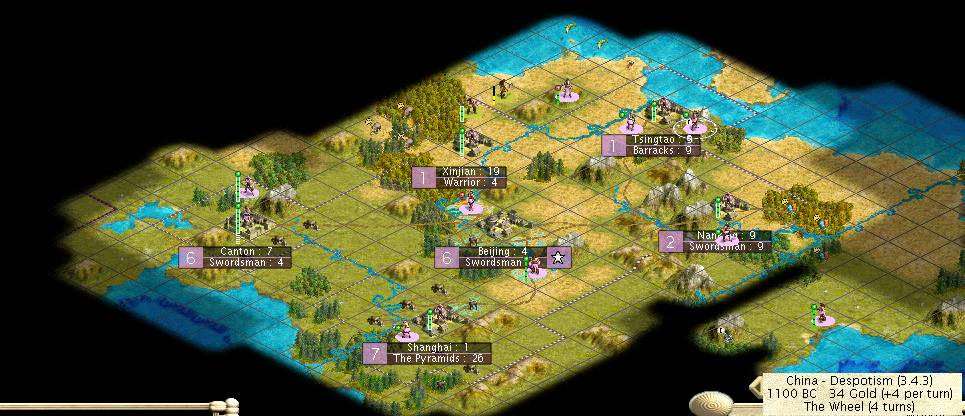
Canton was of course a fortress against enemy attack from that direction. Many warriors and archers came; my archers always got the first attack thanks to superior tactical maneuvering and tore them apart. By the time the AIs started sending spearmen to guard the attackers, I had swords there to take care of that. You can see I've already got elite swords and spears there. Also, any time a spearman got onto the hill just southwest of Canton, I waited for it to move another turn onto flatland before attacking it.
The northern front was a bit less secure. I was doing the best I could using the hills by Xinjian, but I was losing a few units until I could get roads and swords up to that area. I was barely keeping pace with the number of workers I needed, although as always I could've used more. At Canton, I had a worker improve its tiles as soon as the city was founded, then I got the worker out of the combat zone back to safer areas. Canton's wheat tile was improved very early, which turned out to be very important.
Nanking did not have a barracks; it was building warriors (before the iron) and spears for police duty.
Presently America calls me up with the first of many peace offers I'd receive during the game. Thanks, Abe, but I don't think so.
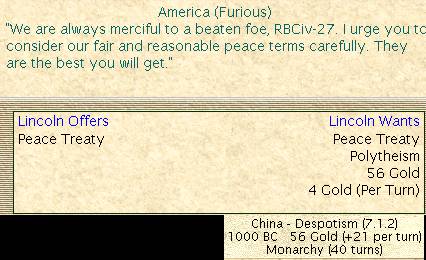
At this time I began one-beaker research on Monarchy, as you can see.
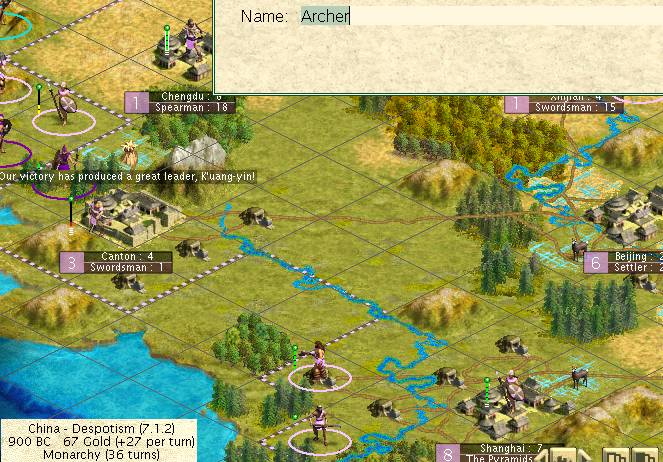
Of course, where there's elite units tearing apart invaders, there's Great Leaders. Shanghai swaps from the Pyramids to the Oracle, and completes that three turns later; then the next turn sees K'uang-yin rush the Pyramids in the city. (Yeah, I self-built the ORACLE in Always War. Bet you don't see that often.)
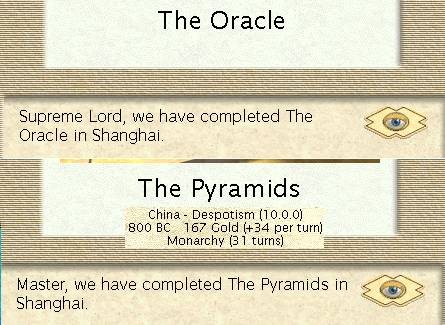
The Oracle actually turned out to help a fair bit with its happiness effect, especially in Shanghai itself.
A second Leader soon came.
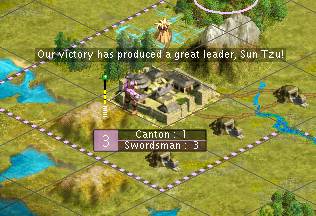
Shanghai's got no wonder to build right now. So that Leader forms an army, into which the archer and sword that produced the leaders go. That army gets a victory, of course, and Shanghai swaps to the Heroic Epic.
In 570 BC, the Ottomans and Egyptians are on the F4 screen (once again I was checking frequently but not every turn.) Here's my last chance for any diplomatic dealings. I have 478 gold in the treasury.
Both civs have Writing, Mathematics, and Horseback Riding, while lacking Polytheism.
Because the power graph shows Ottomans doing better, I trade to Egypt first, because the Ottomans are more likely to have techs farther up the tree to trade for. Polytheism + 12 gold for Writing + Mathematics.
Then Polytheism + 40 gold + WM to Ottomans for Philosophy + Horseback Riding + Map Making. All known civs have the techs I acquired so they're all fully devalued; not everyone has Polytheism yet.
Then Philosophy brokered back over to Egypt in addition to my world map for Code of Laws + territory map.
 The last diplomatic decision I have to make is whether to fork over $260 to Egypt for a world map. I think so; that's invaluable information. Egypt's world map apparently consists of everybody's territory maps but no actual world maps:
The last diplomatic decision I have to make is whether to fork over $260 to Egypt for a world map. I think so; that's invaluable information. Egypt's world map apparently consists of everybody's territory maps but no actual world maps:
 Well, I can then pay 71 gold to Osman for his world map with additional information, and I grin as I resell THAT map back to Egypt for 67 gold. Free map information is always good.
Well, I can then pay 71 gold to Osman for his world map with additional information, and I grin as I resell THAT map back to Egypt for 67 gold. Free map information is always good.
And that's all the map information I can get, and all the brokering I can ever do. War is declared on the Ottomans and Egyptians, and now I begin the process of holding out against the combined might of nine civilizations.
I note that nobody has Literature and the cascade is currently completely stopped (nobody's working on the Great Lighthouse.) I might just have time to research Literature and either build or rush the Great Library even after my minimum science run on Monarchy here. Yeah, I hadn't really been thinking about the Great Library before this point - the co-#1 wonder for Always War along with the Pyramids. Once again I confess to not having a whole lot of real Always War experience.
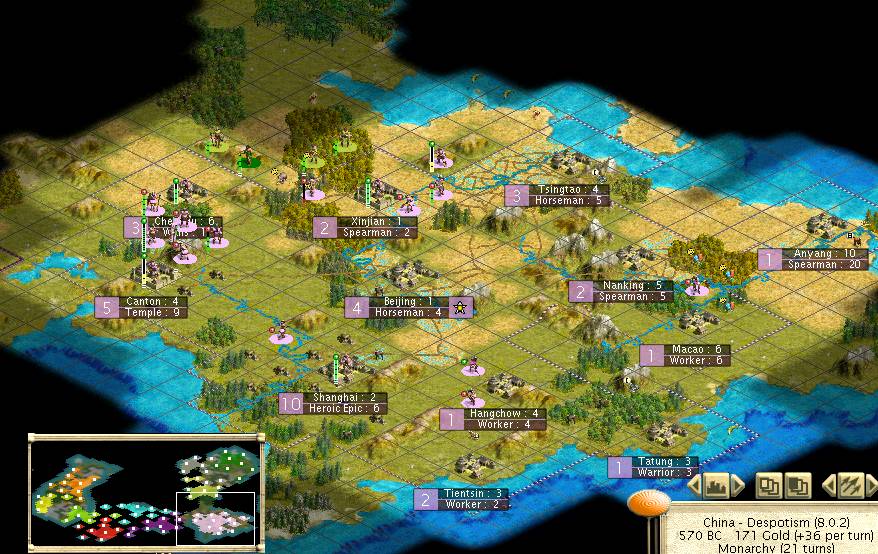
Here's the Ming Empire in 570 BC. Chengdu was founded there for three reasons. First, it's on top of a horses resource; I hadn't yet found the one by Anyang at that time. Second, it's exactly three tiles away from Canton and Xinjian. That spacing lets me keep spears in Chengdu, and move them to either of the other two cities in a single turn as required on defense. Third, notice that there are no high-ground tiles in front of the city, making for a zone to safely kill invaders with low losses.
You can also see a large number of workers around that area. I was making sure to get roads on every tile in the area that I safely could, to ensure the mobility of my forces.
By this time, settlers from Beijing and Nanking had filled in much of that southern area. Macao, Hangchow, Anyang, and Tientsin would become the economic and infrastructural backbone of my China, providing workers and military police units. These cities didn't build any offensive military for a very long time, concentrating on their temples, marketplaces, and libraries, providing the economic support to sustain the military campaigns in the north.
Yeah, those cities are laid out pretty poorly; Nanking's got eight tiles of overlap with other cities but eight unused tiles on its other side. And especially Shanghai has some unused room on each side of it but not really enough for more cities. But, that's what comes from exploring blind as I did in the beginning.
Shanghai completes the Heroic Epic in 470 BC, the earliest I've ever done so. It starts a new Palace prebuild of course, for hopefully the Great Library or failing that the Hanging Gardens.
While those cities were providing economic power, Canton was providing the military power. I pretty much whipped the stuffing out of it - that wheat resource aided by the Pyramids granary provided me a LOT of troops. It was hard, but I had to restrain myself from whipping yet another sword long enough to get a temple up in the city (I whipped that too, which put the city under the influence of a quadruple whip effect). This was critical because of the visibility and information it grants me.
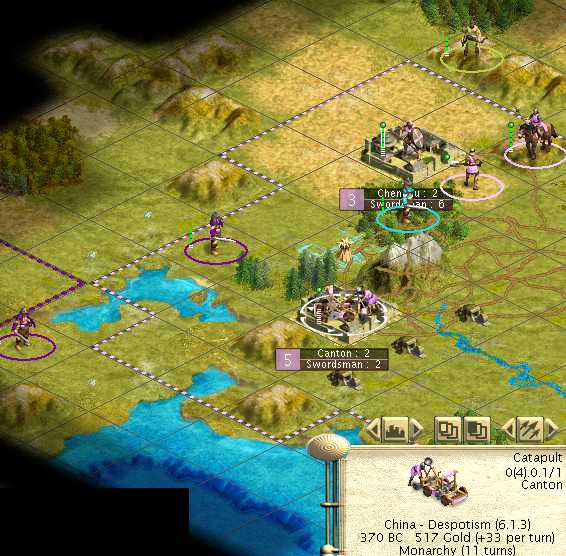
Now I have much better warning of incoming Mounted Warriors. In this picture, for example, I can safely move the active catapult to the wheat square and attack, because I know there are no Mounted Warriors lying in wait that can reach that square. (You can also see my devotion to building that road network. Gotta make darn sure my units can reach anywhere they need to.)
Oh, right, catapults. Yeah, I built some. I had three at Canton and three along the northern front for a very long time. Those were usually enough to wear down incoming spearmen and swordsmen to 2 HP, and save my own veteran and elite swordsmen quite some losses in attacking them.
I also had that army; I often used that army to attack the first unit in an enemy stack BEFORE the catapult bombarding, since the army would always win without needing the enemy unit to be weakened.
And I also built a bunch of horsemen. They were there to attack and kill the last unit of an enemy stack - almost always a weak archer - and retreat to safety in the same turn instead of leaving a sword out in the open.
An important part of preventing all these unit losses was to carefully assess what enemy units must be attacked on a particular turn, and which could wait another turn or two. That picture isn't a great example, but it does show some. The American swordsman next to Chengdu needed to be attacked this turn, of course. The purple stack, however, did not, because they couldn't attack anything of mine on their next turn. (Had that purple stack been Iroquois Mounted Warriors, they would have had to be attacked.)
The Great Wall of Canton-Chengdu-Xinjian would continue its bulwark against those who would invade China for a very, very long time. I have plenty of land for myself; let's build that up and gain a commanding economic advantage over the AIs while they do the Always War nothing-but-units thing.
In 330 BC, I get the message that Babylon is building the Great Library. I'm 9 turns away from Monarchy, and about 20 away from Literature, counting the anarchy. And Shanghai's Palace has 20 turns remaining on it. Perfect timing! I'm sure no AI city is pulling 20 shields/turn, which is what it would take to beat me.
In 170 BC, the minimum-science run on Monarchy reaches its end. Four swordsmen completed last turn, and I whipped two more to complete this turn. I can only hope that my units will hold out until the anarchy ends. We revolt... and get a 6.5 turn anarchy. Yuck.
My border cities hold, since they're all walled with fortified spears (and that army in Canton), and the AIs don't like to attack when the odds are against them. I can counterattack most of the invading units easily enough, but the RNG does cause some attrition, and by the time the anarchy ends, I've got spears penetrating three and four tiles deep into my territory, where I don't have any defense.
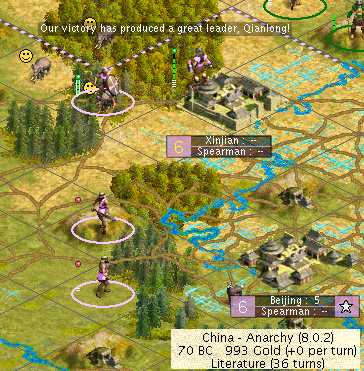 I did pull a third Great Leader during the anarchy, though.
I did pull a third Great Leader during the anarchy, though.
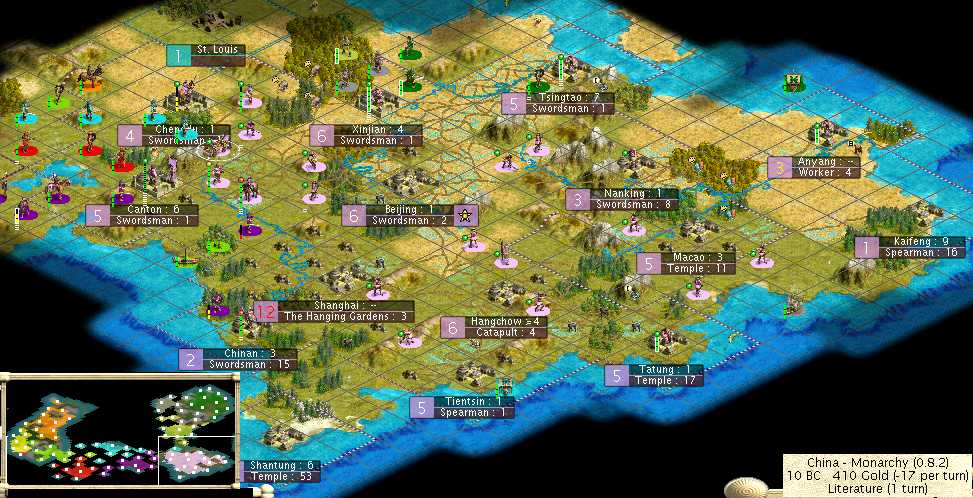
You can see in that picture how far enemy units were penetrating my territory while I couldn't build more units to counterattack them. But, finally, the anarchy ends, and the Ming Kingdom begins. (Sorry, Republic fans, I just can't do it here. ![]() ) So in 10 AD, I cash rush five swordsmen; those with the catapults can prevent any more invaders, but it takes me a while to beat all the units that are already past the Wall. A pair of Japanese spears got all the way over to my iron tile and pillaged it.
) So in 10 AD, I cash rush five swordsmen; those with the catapults can prevent any more invaders, but it takes me a while to beat all the units that are already past the Wall. A pair of Japanese spears got all the way over to my iron tile and pillaged it.
Also, several of those civs - Babylon, Iroquois, and Persia - are in their Golden Ages, and I have to fend off units generated by that production bonus without a similar advantage of my own.
Thanks to some of those units moving onto the river squares, Shanghai rioted for a turn after being auto-reassigned to non-commerce-producing squares and losing a lux tax happy face. And those Japanese spears were just unbeatable.
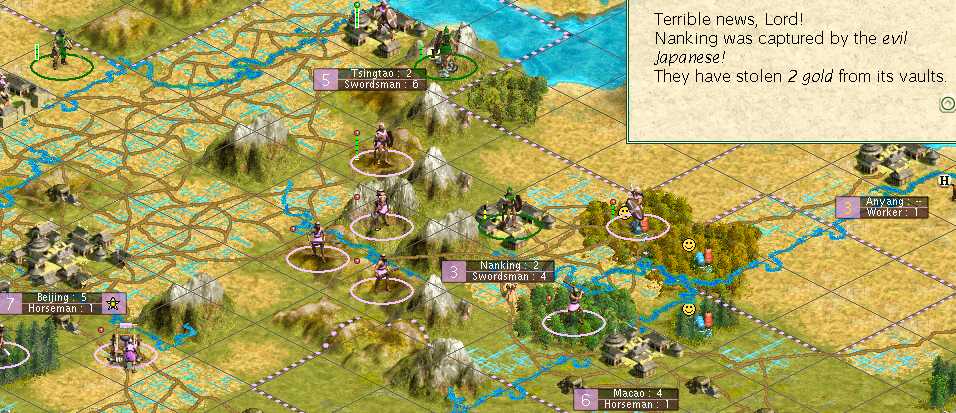
Sheesh. Well, at least it didn't get razed, so the rushed horsemen there recaptured it.
Finally, though, the superior production capacity of China begins to turn the tide. And Shanghai finishes building the Hanging Gardens, and uses Qianlong to rush the Great Library on the next turn. The Library immediately gives me Construction, Currency, and Engineering.
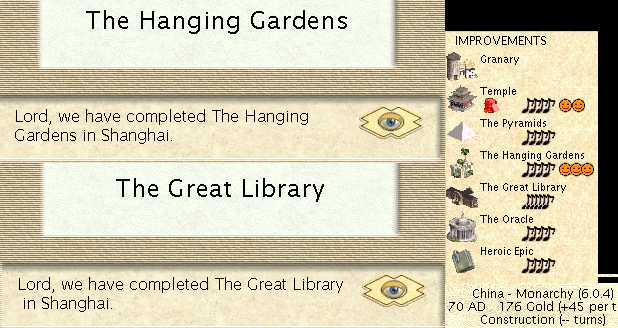
In one city, that's the four top culture ancient wonders, plus the Heroic Epic in ancient times. That's a LOT of culture and should put Shanghai well on the way to victory.